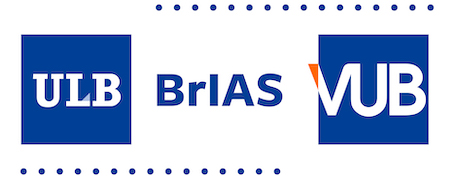
WHY A BRUSSELS INSTITUTE FOR ADVANCED STUDIES, BRIAS ?
Belgium, and Brussels in particular, is a patchwork of different socio-economic and cultural environments. It offers a unique potential for creativity and groundbreaking progress, making it very attractive to high-level researchers, artists, designers and all those who want to help shape a harmonious and sustainable future.
The Université Libre de Bruxelles, ULB, and the Vrije Universiteit Brussel, VUB, are the two leading universities in Brussels. Their origin goes back 150 years. Five out of 10 Belgian Nobel laureates and two Fields medal laureates were professor and/or alumni of the universities1.
The words "Libre" and "Vrije" in their name stands for free enquiry, which postulates independent reasoning and the rejection of all dogma. Indeed, both the ULB and the VUB strive to break down the walls of ignorance and dogmatism by stimulating groundbreaking research at the highest level of creativity, without taboos or prejudice.This implies crossing boundaries and building bridges between disciplines and different socio-economic orcultural environments.
Institutes for Advanced Studies, IASs,are incubators of ideas, with no philosophical or political restriction, where some of the very best scientists, artists or designers, coming from various fields and countries, are given the opportunity towork in an atmosphere of complete freedom, collaboration, mutual emulation and cross-fertilisation.The first IAS was created in Princeton, 1930. Since then, several IASshave been established worldwide.
Despite a considerable number of internationally acclaimed university laboratories, there is noIAS inBrussels or Belgiumas of yet. The authorities of ULB and VUB have therefore decided to create a Brussels Institute for Advanced Studies (BrIAS)as a joint initiative.
Based on submitted projects, BrIAS will offer fellowships and housing to a number, typically between 15 and20,of “BrIASfellows”,for periods of up to 10 months. From 2024 on, it will be located in Usquare, the prestigious,listed and currently being renovated military barracks in Elsene/Ixelles,situated within walking distance of campuses of both the ULB and VUB.
BrIAS will stimulate a close interaction between science and other fields of creativity, which areessential for a harmonious and sustainable future and which will contribute to the prestige of the Brussels universities, region and zone of influence.
1Henri La Fontaine, Nobel peaceprize, alumnus ;Prof. Jules Bordet, Nobel medicineprize; Prof. Albert Claude, Nobel medicineprize;Prof. Ilya Prigogine, Nobel physicsprize;Prof. François Englert, Nobel physicsprize;Dr. Denis Mukwege, Nobel peaceprize, alumnus;Prof. Pierre Deligne, Fields medal, alumnus;Prof. Jean Bourgain, Fields medal, alumnus.
OUR MISSION
The mission of the Brussels Institute for Advanced Studies is:
- To contribute to the advancement of science in an interdisciplinary and transdisciplinary spirit by attracting the very best researchers at international level;
- To progress towards a sustainable world;
- To strengthen both the mutual and worldwide collaborations of the founding universities of BrIAS, thanks to the hospitality offered to researchers and postdocs, thereby generating a community of researchers and alumni, part of the global network of IASs;
- To stimulate the interaction between science and creative fieldssuch as arts and design, essential for a harmonious and sustainable future of the socio-economic and cultural environment of the Brussels region and influence zone;
- To contribute to the prestige of the Brussels Region and its constituents.
Vision
The vision of the Brussels Institute for Advanced Studies is to create an environment which is an incubator of ideas, with nophilosophical or political restrictions, wheresome of the very best researchers, coming from diverse fields, are giventhe opportunity ofpursuingtheir researchin an atmosphere of totalfreedom, collaboration, mutual emulation and cross-fertilisation.
This vision supports the longstanding traditions and aspirations of both the Université Libre de Bruxelles (ULB) and Vrije Universiteit Brussel (VUB) of breaking down the walls of ignorance and dogmatism through science,without taboos or prejudice.
Unique Niche
BrIAS will not simply be just another IAS. The traditions of ULB and VUB as founding universities highlight some unique niches such as subjects with important potential societal impacts; residency for researchers who have had to flee their countries; collaborations with countries where society faces critical challenges with respect to sustainability.
Interdisciplinary themes
In line with the aspiration of both founding universities, the objectives of the Usquareproject, the ERDF convention and the emphyteusis agreement with the Brussels Region, the themes will be based on the UN Sustainable Development Goals.
Periodically, one or more interdisciplinary themes will be defined. The theme(s) willl be broad enough to stimulate international applicants from a multitude of disciplines to submit proposals, thereby allowing optimisation of potential interactionsand cross-fertilisation between the selected BrIAS fellows. The colliding worlds of arts, design, technology and sciences contribute an extra layer of inspiration and creativity.
BrIASfellows
Every year, once BrIASisfully operational, a maximum of20 ‘BrIASfellows’, top personalitiesin their respective fields,will be selected and temporarily move to Brussels for periods up to 10 months. Junior fellows may be selected for shorter stays. The applicants will be invited to specify how their contribution will fit into the general theme of the year, why they have chosen Brussels and which synergies they would like to develop with the local research teams.
Brussels Institute for Advanced Studies,Introductory note, Sunday, March 21, 20213 Commitments by the BrIASfellowsEach fellow will be invited to present his/her work at seminar sessions, followed by a debate with all the attendees.
Presence of the fellows at BrIASwill promote critical discussions, collaborations and communitycohesion.
Working/living environment
BrIASwill provideliving quarters with commonareasto welcome fellows and their families within the BrIASpremises of Usquare. The working and living environment will stimulate scientific creativity, networking and collaboration. The architectural plan will be such that the fellows naturally meet and come together rather than isolate themselves in their living quarters.
The fellows will have access to the on-site infrastructure, such as the FabLab etc...and regular presence inuniversity and affiliated laboratories will be strongly encouraged. Apart from theseminars amongst the fellows, a regular secondaryprogramme will be developed with invited and visiting researchers, artists, designers and people with a key role in society.
The BrIASPilot Phase(2021-2024)
During the pilot phase, BrIASwill be progressively implemented in order to allow BrIASto be fully operational by 2024, when Usquare will be ready to welcome the BrIASfellows and their families. The proposed theme is "The past, present and future of food, climate and sustainability".
BrIAS may already offer a grant, partially covering the living costs or housing, to a limited number of researchers who have chosen to spend a sabbaticalat VUB or ULB.
